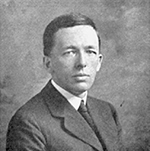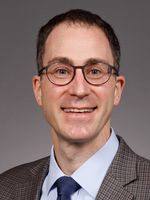The William Maul Measey Professorship of Surgery II

This Professorship was established in 2022, when the value of the endowment of The William Maul Measey Professorship of Surgery had increased sufficiently to support a second professorship. The original Professorship was established in 1971 through gifts from the Benjamin and Mary Siddons Measey Foundation in honor of William Maul Measey (1875–1967), an alumnus of the University of Pennsylvania Law School Class of 1898.
William Maul Measey, a distinguished corporate attorney in Philadelphia, created the Benjamin and Mary Siddons Measey Foundation in 1958 to honor the memory of his parents. Since the Foundation supports several colleges, universities, schools of medicine, and hospitals in the Philadelphia area, the Measey name has become synonymous with the furtherance of medical education in the region.
Current Chairholder
Scott M. Damrauer, MD
 Dr. Damrauer’s research utilizes genomic, proteomic, and metabolomic approaches to characterize the biological pathways and cellular mechanisms that are most relevant in the etiology, progression, and treatment of heart and vascular disease. He is a clinically active vascular surgeon at the Corporal Michael J. Crescenz VA (CMCVA) who treats Veterans with vascular disease daily, and he capitalizes on this in his research program as he leverages the techniques of molecular and genetic epidemiology to understand basic pathophysiology.
Dr. Damrauer’s research utilizes genomic, proteomic, and metabolomic approaches to characterize the biological pathways and cellular mechanisms that are most relevant in the etiology, progression, and treatment of heart and vascular disease. He is a clinically active vascular surgeon at the Corporal Michael J. Crescenz VA (CMCVA) who treats Veterans with vascular disease daily, and he capitalizes on this in his research program as he leverages the techniques of molecular and genetic epidemiology to understand basic pathophysiology.
Dr. Damrauer's research group is working with investigators at the CMCVA, the VA Palo Alto Healthcare System, the VA Boston Healthcare System, and the Atlanta VA Medical Center, to lead the effort to understand the genetic basis of complex cardio-metabolic traits in the VA Million Veteran Program. Specifically, they are using both discovery-based and hypothesis-driven approaches to understand the genetics of peripheral artery disease (PAD), abdominal aortic aneurysm (AAA), and venous thromboembolism (VTE). In addition, they have ongoing related cardio-metabolic and PAD genetics projects utilizing several other large population-based cohorts, including the UK Biobank, PennMedicine BioBank, and the Pakistan Risk of Myocardial Infarction Study.

